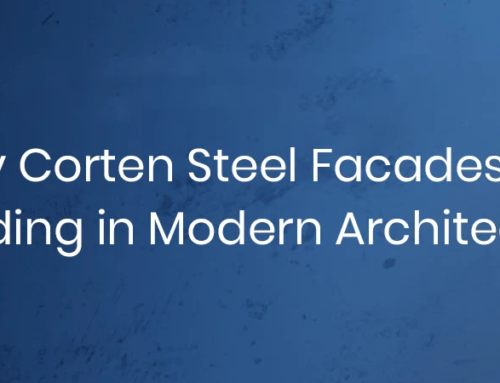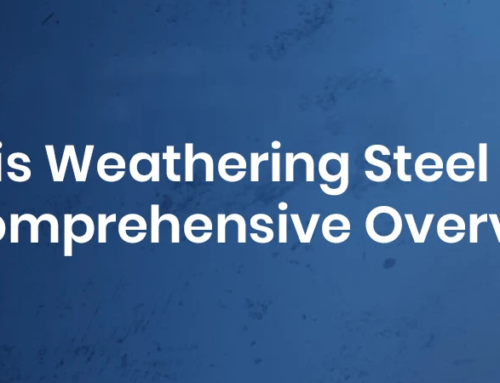What’s the difference between Corten steel and stainless steel?

Stainless steel is familiar for its sleek look and resistance to rust, seen in many things from kitchen tools to buildings. But what’s Corten Steel?
Corten Steel isn’t as well-known, but it’s vital for metalworkers and anyone interested in metals. It’s different from stainless steel—it ages beautifully, staying strong and gaining a unique look.
Unlike stainless steel’s consistent appearance, Corten Steel changes over time, creating a protective layer that adds to its appeal. This makes Corten Steel durable and visually distinct, making it worth exploring for various uses.
Corten Steel vs. Stainless Steel – How Are They Different?
The difference between Corten Steel and Stainless Steel is significant and understanding this dissimilarity is crucial for making informed decisions in metalworking projects.
I recall a conversation with a client seeking an alternative to stainless steel for their outdoor landscaping. They wanted a material that was durable and added a unique aesthetic to their outdoor space. This led me to introduce them to Corten Steel’s distinct qualities.
While stainless steel is excellent with its sleek appearance and resistance to rust, Corten Steel offers something different. Its weathering properties and aesthetic appeal make it stand out for projects requiring a unique touch.
Let’s explore the differences between these two materials:
Corten Steel & Stainless Steel Definition
Properties of Corten Steel vs Stainless Steel
Corten Steel
- Rust Protection: Develops a protective rust layer that gives it a unique appearance and shields it from further corrosion.
- High Strength: Known for its structural strength, making it suitable for various applications.
- Weather Resistance: Can withstand outdoor exposure without significant deterioration.
Stainless Steel
- Corrosion and Stain Resistance: Its high chromium content makes it highly resistant to rust and discoloration.
- Strength and Durability: Durable and strong, making it suitable for a wide range of uses.
- Versatility: Available in different grades to meet specific requirements and offer various properties.
Industry uses of Corten Steel & Stainless Steel
Corten Steel
- Used in architectural projects for its unique appearance.
- Ideal for container ships and bridges due to its strength in harsh environments.
- Popular for garden edging and landscaping elements because of its weathering properties.
Stainless Steel
- Commonly used in kitchen appliances and cookware for its hygiene and corrosion resistance.
- Preferred in construction and architectural projects for its durability and aesthetic appeal.
- Critical in medical equipment and aerospace applications due to its strength and corrosion resistance.
Cost of Corten Steel and Stainless Steel
Corten Steel
- Initial Cost: Generally more affordable than stainless steel, making it attractive for projects with budget constraints.
- Long-Term Cost: Low maintenance and long lifespan contribute to cost-effectiveness over time, despite initial savings.
- Installation Costs: High tensile strength may affect manufacturing and installation costs, but weathering properties can offset finishing expenses.
Stainless Steel
- Initial Cost: Higher than Corten Steel due to its superior quality, which may impact budget decisions.
- Long-Term Cost: Durability and anti-corrosion properties result in long-term cost savings through minimal maintenance and extended lifespan.
- Installation Costs: Versatility and ease of manufacturing lead to straightforward installation, although initial costs may be higher.
Considering both initial and long-term costs, Corten Steel offers affordability upfront and potential savings over time, while Stainless Steel provides durability and longevity with higher initial investment.
Advantages and Disadvantages of Corten Steel
Advantages of Corten Steel
- Unique Aesthetic Appeal: Corten Steel's deliberate rusting process creates a distinct, weathered appearance that evolves over time, making it visually appealing for artistic and outdoor projects.
- Weather Resistance: Designed to resist atmospheric corrosion, Corten Steel maintains its structural integrity in various climates, making it suitable for exterior installations and constructions.
- Minimal Maintenance: Requires little maintenance over its lifespan due to the protective rust layer, reducing upkeep costs and making it convenient for long-term use without frequent coatings.
- High Tensile Strength: Possesses high tensile strength, making it suitable for structural applications and enhancing its durability and resilience in challenging conditions.
Disadvantages of Corten Steel
- Higher Initial Cost: Stainless Steel typically has a higher initial cost compared to Corten Steel, which can be a factor in projects with budget limitations.
- Susceptibility to Scratching: Certain grades of Stainless Steel can be prone to showing scratches and marks, especially in high-traffic areas. This may be a consideration for projects where maintaining a flawless appearance is important.
Conclusion
Considering the unique properties and considerations of Corten Steel and Stainless Steel, it’s important to assess your project’s specific needs and priorities. If you’re looking for a reliable supplier of Corten Steel, Corten Steel Tube is a leading provider known for quality materials and expertise in Corten Steel products. Their range of Corten Steel offerings, including tubes, sheets, and custom fabrication options, makes them a valuable resource for projects requiring the distinct characteristics of Corten Steel.
Whether you choose Corten Steel for its weathering appeal, minimal maintenance requirements, and high tensile strength, or opt for Stainless Steel for its corrosion resistance, sleek appearance, and versatility in grades, selecting the right material is crucial for achieving the desired outcome. Consulting with experts like Corten Steel Tube can ensure you get the best quality and support for your metal fabrication needs.







Leave A Comment